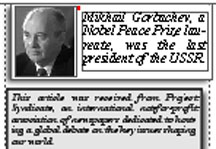By Mikhail Gorbachev
MOSCOW – When Russian President Dmitri Medvedev delivered his annual address to the Federal Assembly I was struck by the fact that his speech seemed to be meant for an advanced, prosperous country, not the real Russia of today.
Russia will hold a presidential election in 2012. What happens in 2011 will, in my opinion, be even more important than the election itself. Indeed, the evolution of Russian society could transform Russian politics, despite those domestic opponents who deny change or those who unqualifiedly classify Russia as “incorrigibly authoritarian.” But, in order for that to happen, a new agenda for Russia must be developed this year.
A decade ago, defence of Russia’s territorial integrity and restoration of governability topped the list of priorities. People supported a president, Vladimir Putin, who was devoted to this “stabilization” agenda. We may debate the means by which it was pursued, and how successfully, but Russia’s “existential” challenges were largely overcome.
 But progress on stabilization only highlighted Russia’s unresolved problems, which the global financial crisis exacerbated, but did not cause. After all, Russia’s resource-based, de-industrializing, expenditure-driven economy is the result of purely domestic choices. Nor was it the crisis that gave rise to corruption, which affects officialdom at all levels, or that caused Russia to lose its democratic dynamic.
But progress on stabilization only highlighted Russia’s unresolved problems, which the global financial crisis exacerbated, but did not cause. After all, Russia’s resource-based, de-industrializing, expenditure-driven economy is the result of purely domestic choices. Nor was it the crisis that gave rise to corruption, which affects officialdom at all levels, or that caused Russia to lose its democratic dynamic.
We Russians rode along on oil and gas, forgetting that these resources will not last forever. But, even with favourable world market conditions, we did not manage to solve the problem of poverty, in which millions of Russians still live.
I am convinced that Russia’s troubles all come down to politics. We need a democratic, competitive environment, initiative at all levels, an active civil society, and real public control. Only under such conditions will difficult problems lend themselves to solution.
But, starting in 2005-2006, the authorities implemented measures that made responsiveness to acute problems practically impossible. The decisions to appoint, rather than elect, regional governors, to introduce party-list voting, to raise the electoral threshold for parties to enter the Duma, and to repeal the minimum-turnout requirement – all accompanied by rampant manipulation of elections and the mass media – created a political system closed to feedback from society. Not surprisingly, the political elite became self-absorbed and served only its own narrow interests
.
This summer, with wildfires raging outside Moscow, the elite’s isolation took on a menacing nature. But something else happened: society became more demanding, recognizing its own interests and knowing how to express them.
Although the traditions of self-organization in Russian society are neither deep nor strong, real movement in this direction became visible for all to see. Activists from public movements, journalists, ecologists, businessmen, and ordinary people who had suffered the tyranny and corruption of public officials began to join in.
The authorities have recognized this, at least to some degree. Medvedev’s decision to suspend construction of a highway through the Khimki forest near Moscow in the face of widespread civic protest was important. For many months, Moscow and federal authorities ignored the highway’s opponents, so Medvedev’s decision was a signal: contempt for the people is inadmissible.
Yet right after that, the bureaucracy tried to turn the public hearings – called to give people and civil institutions a voice in solving such problems – into an empty formality.
So the struggle between democratic and anti-democratic tendencies is becoming acute. If the anti-democratic tendencies win out, all that we have accomplished in previous years will be jeopardized – including stability itself.
This threat evidently motivated Medvedev to speak out in November: “It is no secret,” Medvedev wrote in his blog, “that, as of a certain period, symptoms of stagnation have begun to appear in our political life, and the threat of turning stability into a factor of stagnation has appeared.”
The president’s statement was unexpected. Medvedev’s assessment attested to his understanding that Russia’s problems are rooted in its politics – in the degradation of the ruling party, in the absence of a real opposition, and in the lack of respect for the rights of political minorities.
I welcome Medvedev’s emphasis on social concerns and his anti-bureaucratic rhetoric.
But his statements are only a first step toward formulating a new Russian agenda, the first point of which must be a renewal and acceleration of movement toward real and effective democracy. It is vital that Russians believe that Medvedev’s words reflect his priorities, and that he is prepared to fight for them.
Among these priorities, one of the most important is education. We have approached the point when the constitutional requirement of universal, free education may become a fiction. People are asking: How is it that, after World War II, the state had enough money to provide free education, whereas today’s Russian state does not?
Society also demands effective mechanisms for combating corruption, which is turning into a serious political problem, precisely because it has widened the gap between the people and the authorities. Indeed, today’s elite cannot or will not solve the problem. Only a serious presidential initiative, supported by civil society and brave new political forces, can do the job.
The new agenda must also include a strong economic component. Patching up holes in the budget and individual initiatives are not enough to ensure economic renewal. Russia needs a breakthrough toward an up-to-date, knowledge-based, and ecologically sustainable economy. Here, I see a direct connection with the problem of education.
I am convinced that Medvedev must become the leader in the process of formulating the new Russian agenda, and he must act in the coming year. Society will support him.





